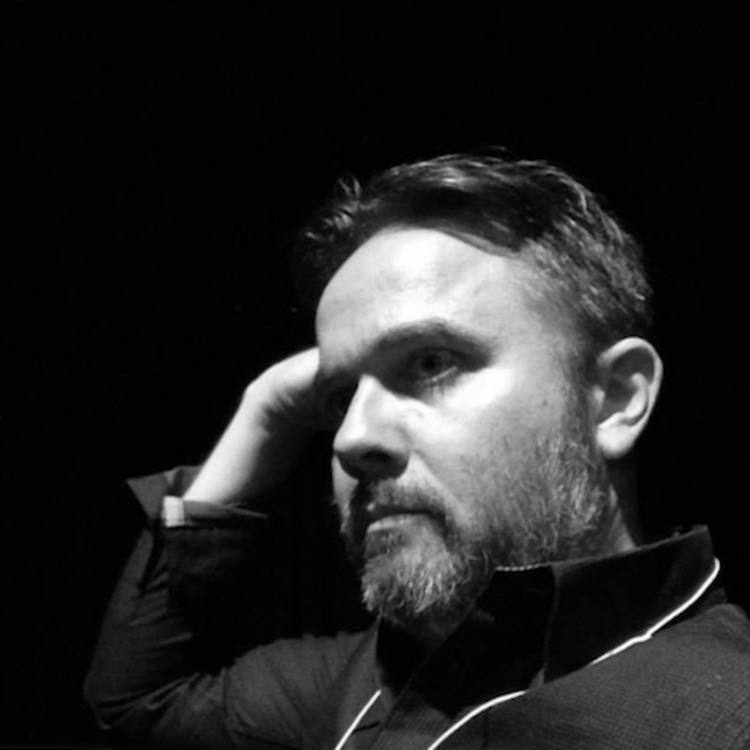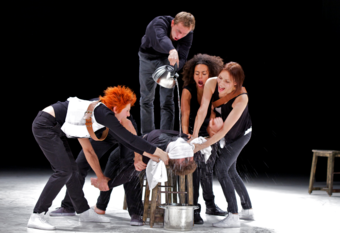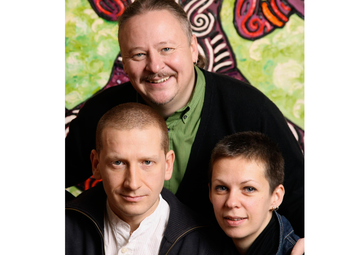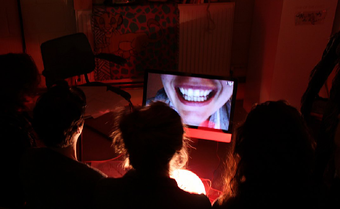Theatre at Belarus’ University in Exile
This six-part series explores how the work of Belarus Free Theatre changed an American expatriate's life, inspiring him to find new ways to use theater, writing, and social activism.
One of the groups participating in Ensemble Free Theater Norway’s Belarusian Dream Theater project was the European Humanities University in Vilnius, a private liberal arts institution serving approximately 1500 students and sometimes referred to as Belarus’ “university in exile.” Founded in Minsk in 1992, EHU was expelled by the Belarusian authorities in 2004, and for the past decade has been based in neighboring Lithuania. One of the few Belarusian educational institutions operating autonomously, EHU aims to offer courses in the humanities and the social sciences that are of a Western standard, in order to open the students’ minds “to those values constituting the basic principles of democracy,” according to Anatoli Mikhailov, one of the university’s founders.
The majority of students are Belarusian, with nearly two-thirds studying remotely from Belarus through online courses. The university offers a number of Bachelors and Masters programs in Media & Communication, Visual Design, and the Theory of Contemporary Art, but few practical courses in disciplines such as theater or dramatic writing.
When Jurga Meckinskiene and Tatsiana Babich, two of EHU’s staff members, invited me to direct some of the plays for Belarusian Dream Theater with their Belarusian undergraduates, I was both honored and excited at the opportunity. First and foremost, I was certain that the experience would be particularly relevant for the mission of the project—in addition to performances and readings internationally, it was important that these plays could also be interpreted by Belarusian men and women themselves. I was eager to see what would be uncovered through the work. In addition to rehearsing these plays, however, the students at EHU also shared some complex and contradictory feelings about their country.
For example, when choosing which of the twenty-five new short plays about Belarus to stage for the 25 March event, one of the students told me in an email that the plays did not “involve the main problem of our country and its society,” that the works were “not about the Belarusians at all.” According to her, Belarusians “are not hospitable—it is a complete myth as well as the stories of our tolerance.” She also asserted, “we never in our post-Soviet history say that our country is beautiful and marvelous, because we firmly believe it is the black pit of the world.” By her estimation, most of her fellow citizens in Belarus are “morose, silent, and always waiting for a miracle to happen and change their lives. Our society is completely confused with their lives and not responsible for them. We are a people—not even a nation yet—of complete irresponsibility.”
While by no means uniform amongst the students I worked with, this perspective became a palpable presence in the rehearsal room. Especially in the beginning, this particular student would frequently get into a political debate with me or with her scene partner. She equated her country with the phrase "this stability is like death." For her, the only relevant theater about Belarus would be one in complete accord with her own personal experience, one which she felt could not be articulated in dialogue or in words. When I asked her what she thought ought to be written about Belarus instead, she succinctly described a proposed drama this way: “Nothing happens from the beginning, and in the end everyone gets drunk.”
I found this perspective ironic, as well as more than a bit sad. While clearly dismayed at the political or personal paralysis demonstrated by her fellow citizens, this critical Belarusian university student remained inactive herself. She criticized those who attempted to speak up, while silencing her own voice through self-censorship. Since beginning this dialogue with her over email before arriving in Vilnius, and during the subsequent days we worked together at EHU, I encouraged her to make something of her own; to create something that she felt portrayed a better picture of Belarus.
Unfortunately, nothing came of it. It’s easy to criticize the work of others—such as these international playwrights—as being “irrelevant,” or say that their narratives about Belarus are “inaccurate.” Much more challenging is to get into action, and write something, stage something, act something. And while there may be factual inaccuracies within these plays, we must remember that these are stories meant to be heard in a theater, not journalistic pieces meant to be read in a newspaper. None of the playwrights or participating groups involved with the Belarusian Dream Theater project claimed that these works were definitive, nor claimed perfection in their perspectives or their fictional portrayals. Our motivation was simple: our feelings about Belarus inspired us to want to do something, using the (creative) tools that we have. I, along with my friends and colleagues around the world, attempted to do something more than remain idle or silent.
As you can imagine, our rehearsals at EHU were lively, stimulating discussions about each of our individual relationships to Belarus. Our links to the country sometimes overlapped, many times diverged. We talked about these relationships, interrogated ourselves and each other, and tried to put all of it into the work. We searched for a Belarus we could all inhabit. The majority of the students disagreed with their classmate’s pessimistic outlook, stating repeatedly that the Belarusian people were too diverse to be universally categorized in such terms. They appreciated the range of stories, subjects, and themes within the Belarusian Dream Theater collection, as they felt that they helped show the range of experience about the country, and not just another dogmatic piece about Lukashenko. But I don’t think the experience, the performances, or the learning would have happened, if we had all agreed. Our dissension within our theatrical context proved constructive. I was grateful for the tough questions.
The performance was held at Užupio Kavine, a district across the river from Vilnius’ Old Town reminiscent of Copenhagen’s Christiania. Babich didn’t think we would get more than fifty people to attend the performance on 25 March, which included stagings of Vivienne Glance’s Draniki and Rex McGregor’s Welcome to Belarus, following a short acoustic set by Belarusian singer Polina Smolava. We were all delightfully surprised to see more than 225 people show up, comprised of Belarusian university students and Lithuanian retirees, members of EHU’s international staff, and curious bohemians from the “free republic of Užupis.” Young or old, the standing-room audience seemed to enjoy both the concept and the presentation of the Belarusian Dream Theater project.
After graduating from EHU, some students intend to return to Belarus. They feel that starting a career and building a life would be easier in their native land. Others have no plans to return, instead longing to continue traveling abroad, and perhaps immigrate to somewhere else in Europe. Like any group of people, these Belarusian students embody a diversity of opinion and perspective, one far more nuanced than is often portrayed in mainstream journalism. Hopefully, through further creative and collaborative activities such as dramatic writing or the Belarusian Dream Theater project, all of us can glimpse this, the true face of Belarus, more clearly.







Comments
The article is just the start of the conversation—we want to know what you think about this subject, too! HowlRound is a space for knowledge-sharing, and we welcome spirited, thoughtful, and on-topic dialogue. Find our full comments policy here